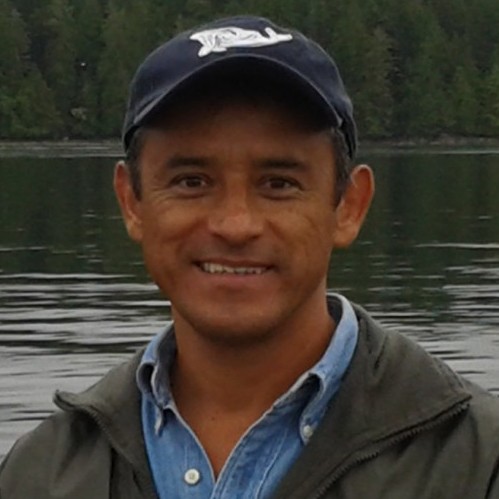Alfonso Cuevas
About
 Dr. Alfonso Cuevas Jiménez is interested in the assessment of the coral reef ecosystem and the adaptability of coastal communities to the effects of climatic changes. He is working in the Mahahual community, Quintana Roo, México and dealing with recreational tourism which depends on coral reef health. He has a background in marine sciences and engineering. In 2014, he completed a Doctorate in Engineering at the Institute of Engineering, UNAM. He holds a Master of Science in Marine Biology from the Center for Research and Advanced Studies of the IPN, Oceanology Unit Mérida, 1999. In 1993, he graduated from the School of Marine Sciences, Autonomous University of Baja California with honors. He has served as a research assistant in projects related to coastal management and studies on ecology of coral reefs and beaches studies. Dr. Cuevas joined the Marist University of Merida in 1999. He served as the Principal of the School of Natural Resources at the same University from 2002 to 2004. He has been a professor of Remote Sensing, GIS, Marine Ecology and Coastal and Research Methodology. He has also taught in the Bachelor program of Sustainable Coastal Zone Management in the Faculty of Sciences and the Graduate Program in Marine Sciences and Limnology, UNAM, in UMDI Sisal, Yucatán. Currently he is a professor at the Marist University of Merida in the investigation line of coastal ecosystem studies. Since 2007 he has been the Coordinator of the Marist Experimental Unit (UNEXMAR). UNEXMAR leads the academic practices and experiments of the School of Natural Resource Management and fosters in students of all grade levels as well as farmers, the benefits of integrated food production systems as an alternative contribution to sustainable development and poverty alleviation in an interdisciplinary way and analyzes the factors that influence the processes of ownership-transfer of these systems.
Dr. Alfonso Cuevas Jiménez is interested in the assessment of the coral reef ecosystem and the adaptability of coastal communities to the effects of climatic changes. He is working in the Mahahual community, Quintana Roo, México and dealing with recreational tourism which depends on coral reef health. He has a background in marine sciences and engineering. In 2014, he completed a Doctorate in Engineering at the Institute of Engineering, UNAM. He holds a Master of Science in Marine Biology from the Center for Research and Advanced Studies of the IPN, Oceanology Unit Mérida, 1999. In 1993, he graduated from the School of Marine Sciences, Autonomous University of Baja California with honors. He has served as a research assistant in projects related to coastal management and studies on ecology of coral reefs and beaches studies. Dr. Cuevas joined the Marist University of Merida in 1999. He served as the Principal of the School of Natural Resources at the same University from 2002 to 2004. He has been a professor of Remote Sensing, GIS, Marine Ecology and Coastal and Research Methodology. He has also taught in the Bachelor program of Sustainable Coastal Zone Management in the Faculty of Sciences and the Graduate Program in Marine Sciences and Limnology, UNAM, in UMDI Sisal, Yucatán. Currently he is a professor at the Marist University of Merida in the investigation line of coastal ecosystem studies. Since 2007 he has been the Coordinator of the Marist Experimental Unit (UNEXMAR). UNEXMAR leads the academic practices and experiments of the School of Natural Resource Management and fosters in students of all grade levels as well as farmers, the benefits of integrated food production systems as an alternative contribution to sustainable development and poverty alleviation in an interdisciplinary way and analyzes the factors that influence the processes of ownership-transfer of these systems.
Teaching and students
He currently teaches undergraduate and graduate classes in Geographical Information Systems. He supervises thesis topics about spatial analysis of variables such as bio-physics, economics, and social aspects in fisheries and ecosystem management, as well as detection of beach erosion and ecosystem changes using remote sensing and geostatistics.
Current Projects
1) Assessment of beach erosion vulnerability; 2) Spatial analysis of sea cucumber density distribution; 3) Detection of changes using remote sensing with high spatial resolution imagery in coral reef ecosystems; 4) Analysis of spatial distribution of lobster’s habitats and fishing effort.
Key Publications
- Isla-Esquivel, M.L., Cuevas-Jiménez, A. y Romero-Yam, L.A. (2011). Factores sociales que afectan el cultivo de tilapia en la Península de Yucatán. Ambiente y Desarrollo. 15(29): 9-32.
- Cuevas-Jiménez, A. y J. Euán Ávila, (2009). Morfodinámica del perfil de playa con sedimentos carbonatados en la Península de Yucatán. Revista Ciencias Marinas. 35(3): 307-320.
- Cuevas-Jiménez, A., P.L. Ardisson and A.R. Condal, (2002). Mapping of shallow coral reefs by colour aerial photography. International Journal of Remote Sensing. 23(18): 3697-3712.
- Cuevas-Jiménez, A., Orellana Lanza R. y Euán Ávila, J.I. (2014). Capítulo VII. Patrones locales de viento. En: La Costa del Estado de Yucatán. Un espacio de reflexión sobre la relación sociedad-naturaleza, en el contexto de su ordenamiento ecológico territorial. Euán Ávila J.I., García de Fuentes, A. Liceaga Correa, M.A. y Munguía Gil, A. (Eds.). Plaza y Valdés, S.L., México. Vol. 1: 137-149.
- Euán Ávila, J.I. Cuevas-Jiménez, A. y Maldonado Repetto, A. (2014). Capítulo XII. Características biofísicas del litoral. En: La Costa del Estado de Yucatán. Un espacio de reflexión sobre la relación sociedad-naturaleza, en el contexto de su ordenamiento ecológico territorial. Euán Ávila J.I., García de Fuentes, A. Liceaga Correa, M.A. y Munguía Gil, A. (Eds.). Plaza y Valdés, S.L., México. Vol. I: 213-222.
- Euán Avila, J. and A. Cuevas-Jiménez, (2009). Regionalizing Coastal Zones with Geospatial Tools for Integrated Coastal Zone Management. In: Coastal and Marine Geospatial Technologies, Coastal Systems and Continental Margins. D.R. Green (ed.), Springer, Chapter 14.


